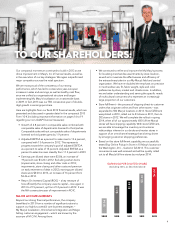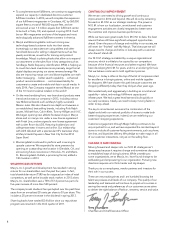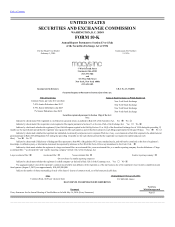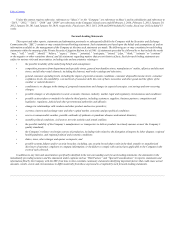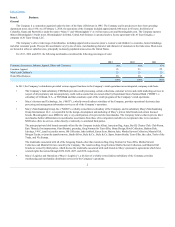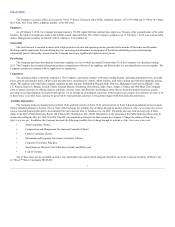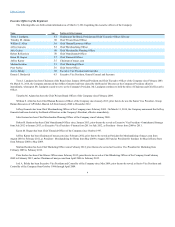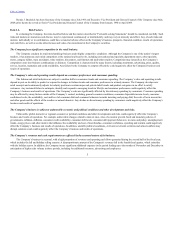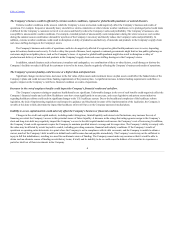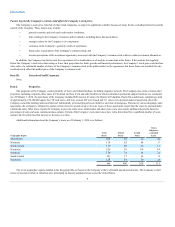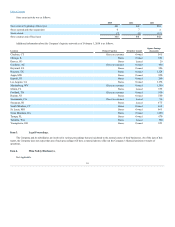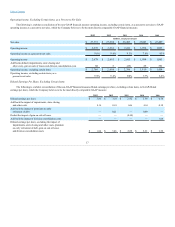Macy's 2013 Annual Report Download - page 13
Download and view the complete annual report
Please find page 13 of the 2013 Macy's annual report below. You can navigate through the pages in the report by either clicking on the pages listed below, or by using the keyword search tool below to find specific information within the annual report.
Table of Contents
Parties with whom the Company does business may be subject to insolvency risks or may otherwise become unable or unwilling to perform their
obligations to the Company.
The Company is a party to contracts, transactions and business relationships with various third parties, including vendors, suppliers, service
providers, lenders and participants in joint ventures, strategic alliances and other joint commercial relationships, pursuant to which such third parties have
performance, payment and other obligations to the Company. In some cases, the Company depends upon such third parties to provide essential leaseholds,
products, services or other benefits, including with respect to store and distribution center locations, merchandise, advertising, software development and
support, logistics, other agreements for goods and services in order to operate the Company’s business in the ordinary course, extensions of credit, credit card
accounts and related receivables, and other vital matters. Current economic, industry and market conditions could result in increased risks to the Company
associated with the potential financial distress or insolvency of such third parties. If any of these third parties were to become subject to bankruptcy,
receivership or similar proceedings, the rights and benefits of the Company in relation to its contracts, transactions and business relationships with such third
parties could be terminated, modified in a manner adverse to the Company, or otherwise impaired. The Company cannot make any assurances that it would
be able to arrange for alternate or replacement contracts, transactions or business relationships on terms as favorable as the Company’s existing contracts,
transactions or business relationships, if at all. Any inability on the part of the Company to do so could negatively affect the Company’s cash flows, financial
condition and results of operations.
A material disruption in the Company’s computer systems could adversely affect the Company’s business or results of operations.
The Company relies extensively on its computer systems to process transactions, summarize results and manage its business. The Company’s
computer systems are subject to damage or interruption from power outages, computer and telecommunications failures, computer viruses, cyber-attack or
other security breaches, catastrophic events such as fires, floods, earthquakes, tornadoes, hurricanes, acts of war or terrorism, and usage errors by the
Company’s employees. If the Company’s computer systems are damaged or cease to function properly, the Company may have to make a significant
investment to fix or replace them, and the Company may suffer loss of critical data and interruptions or delays in its operations. Any material interruption in
the Company’s computer systems could negatively affect its business and results of operations.
A privacy breach could result in negative publicity and adversely affect the Company’s business or results of operations.
The protection of customer, employee, and company data is critical to the Company. The regulatory environment surrounding information security and
privacy is increasingly demanding, with the frequent imposition of new and constantly changing requirements across business units. In addition, customers
have a high expectation that the Company will adequately protect their personal information from cyber-attack or other security breaches. A significant breach
of customer, employee, or company data could attract a substantial amount of media attention, damage the Company’s customer relationships and reputation
and result in lost sales, fines, or lawsuits.
Litigation, legislation or regulatory developments could adversely affect the Company’s business and results of operations.
The Company is subject to various federal, state and local laws, rules, regulations, inquiries and initiatives in connection with both its core business
operations and its credit card and other ancillary operations (including the Credit Card Act of 2009 and the Dodd-Frank Wall Street Reform and Consumer
Protection Act of 2010 (the “Dodd-Frank Act”)). Recent and future developments relating to such matters could increase the Company's compliance costs and
adversely affect the profitability of its credit card and other operations. The Company is also subject to anti-bribery, customs, child labor, truth-in-advertising
and other laws, including consumer protection regulations and zoning and occupancy ordinances that regulate retailers generally and/or govern the importation,
promotion and sale of merchandise and the operation of retail stores and warehouse facilities. Although the Company undertakes to monitor changes in these
laws, if these laws change without the Company's knowledge, or are violated by importers, designers, manufacturers, distributors or agents, the Company
could experience delays in shipments and receipt of goods or be subject to fines or other penalties under the controlling regulations, any of which could
negatively affect the Company's business and results of operations. In addition, the Company is regularly involved in various litigation matters that arise in
the ordinary course of its business. Adverse outcomes in current or future litigation could negatively affect the Company’s financial condition, results of
operations and cash flows.
8


